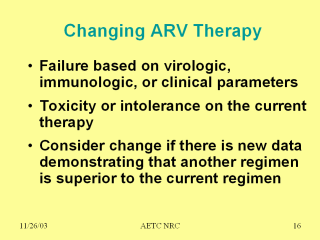| front |1 |2 |3 |4 |5 |6 |7 |8 |9 |10 |11 |12 |13 |14 |15 |16 |17 |18 |19 |20 |21 |22 |23 |24 |25 |26 |27 |28 |review |
 |
Three reasons warrant a change in
antiretroviral therapy: a) failure of the current regimen with evidence of
disease progression based on virologic, immunologic, or clinical parameters
b) toxicity or intolerance of the current regimen; and c) new data
demonstrating that a drug or regimen is superior to the current regimen. When treatment fails or provides only sub-optimal response, clinicians working with patients and their families need to assess the likely contribution of adherence problems to the failure of the current regimen. Even small lapses in adherence can lead to antiretroviral treatment failure. Directly observed therapy, including inpatient hospitalization, may be necessary to distinguish between inadequate adherence and medication failure. Issues regarding adherence should be addressed to increase the likelihood of a successful outcome when initiating any new regimen. Intensive family education, training in the administration of prescribed medications, and discussion of the importance of adherence to the drug regimen should be completed before initiation of new treatment. In addition, frequent patient visits and intensive follow-up during the initial months after a new antiretroviral regimen is started are necessary to support and educate the family and to monitor adherence, tolerance, and virologic response to the new regimen. |